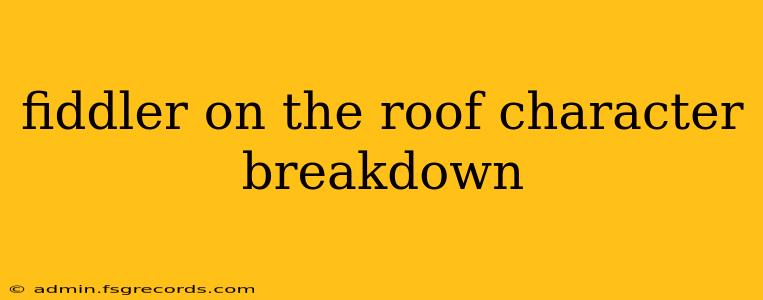Fiddler on the Roof, a beloved musical masterpiece, captivates audiences with its timeless tale of tradition, change, and family. Understanding the characters is key to appreciating the show's emotional depth and enduring relevance. This breakdown explores the complexities of the main characters, examining their motivations, conflicts, and ultimate contributions to the narrative.
Tevye the Dairyman: The Heart of the Story
Tevye, the central character, is a poor milkman living in the small Russian village of Anatevka. He's a man of unwavering faith, clinging to his traditions and his deeply held beliefs in God and the established order. His internal struggle forms the core conflict of the musical: balancing his devout adherence to tradition with the changing world around him and the evolving desires of his daughters. Tevye's humor, often self-deprecating, masks a profound vulnerability and a quiet desperation to maintain control in the face of the inevitable. He's both stubborn and loving, a flawed yet relatable patriarch grappling with the complexities of fatherhood in a rapidly shifting society. His famous soliloquies, like "If I Were a Rich Man," reveal his dreams and anxieties, exposing his humanity and making him instantly endearing.
Tevye's Key Conflicts:
- Tradition vs. Modernity: This is Tevye's central conflict. He grapples with the changing world, particularly the evolving attitudes of his daughters towards marriage and tradition.
- Faith vs. Doubt: While deeply religious, Tevye questions God's will, particularly when faced with hardship and the challenges of his daughters' choices.
- Control vs. Acceptance: Tevye desperately tries to control his daughters' lives, yet ultimately learns to accept their choices, even when they defy his expectations.
Golde: The Steadfast Matriarch
Golde, Tevye's wife, is the quiet strength behind the family. While less overtly expressive than Tevye, she is equally strong-willed and deeply committed to her family and traditions. Her pragmatism often contrasts with Tevye's more emotional and philosophical approach. Though seemingly subservient, Golde possesses a quiet power, subtly influencing decisions and navigating the complexities of their lives. Her relationship with Tevye showcases a long-lasting marriage built on shared faith, mutual respect (even if unspoken at times), and a deep understanding born from years of shared experience.
The Daughters: A Generation Gap
Tevye's five daughters, each with a distinct personality, represent the changing times. Their individual stories reflect the societal shifts and the evolving roles of women in the early 20th century.
- Tzeitel: The eldest, Tzeitel is torn between filial duty and her own desires. She embodies the conflict between tradition and personal happiness.
- Hodel: She represents a willingness to embrace change and follow her heart, even if it means defying tradition.
- Chava: The youngest, Chava's decision to marry outside their faith ultimately breaks her father's heart and highlights the irreconcilable differences between generations.
- Shprintze and Bielke: These younger daughters, while less prominent, represent the unfolding future for young women in the face of changing times.
Other Notable Characters:
- Yente: The matchmaker, a comical yet insightful character who provides commentary on the social dynamics of Anatevka.
- Mordcha: The butcher, a representative of the struggling community.
- Perchik: A radical student who challenges Tevye's traditional views, representing the intellectual and social changes brewing in the world.
- Fyedka: A revolutionary who advocates for change and embodies the political unrest of the time.
The Enduring Power of Fiddler on the Roof
The success of Fiddler on the Roof lies in the relatable and complex characters that populate its world. They represent the universal themes of family, tradition, love, faith, and the inevitable march of progress. By exploring these themes through the lens of a specific time and place, the musical achieves a timeless quality that continues to resonate with audiences today. Each character, from the stubborn Tevye to the defiant Chava, contributes to a tapestry of human experience that is both heartbreaking and deeply satisfying. The enduring appeal of Fiddler on the Roof stems from its ability to portray these complex characters with such empathy and understanding.

